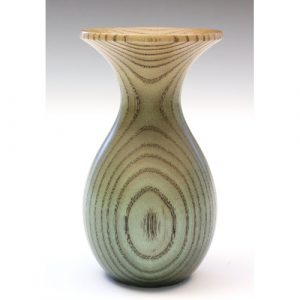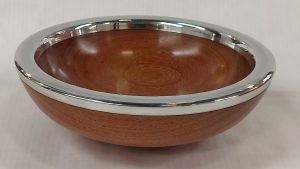Tuition in Gloucestershire
Subscribe
Please subscribe to my course mailing list below to be kept updated on course availability and dates.
Ways to buy / book
- If you have a voucher, contact me for further details, to book direct or to request a one to one
- If you are giving a course as a gift, vouchers are available.
- To book one of the set course dates for yourself, you can click the buttons on the right to choose a specific course and date or use the shop menu above to explore available courses and dates. If you have any queries, or are looking for something specific, feel free to get in touch.
- Visit the Course Dates page to see the calendar and list of courses.
Introduction
Woodturning can be a very rewarding pastime but as with any craft, some tuition and guidance can put you on the right track. Paul can accommodate up to four people if you and a friend (or three!) wanted to learn woodturning together. You can book together or you can book individually. Woodturning lessons from absolute beginner to advanced can be arranged and can be tailored to suit your requirements. Below are some of the general areas covered in the beginners woodturning course and some topics for intermediate and advanced levels when you feel ready to progress further.
Courses are held at Paul’s workshop in the Forest of Dean, Gloucestershire but if you would prefer one to one tuition on your own equipment in your own workshop, that can be arranged.
Paul is a member of the Association of Woodturners of Great Britain (AWGB) and is an AWGB approved instructor.
Remote Workshops
Paul is also able to offer remote tuition using Zoom for those who are too far away to travel. I can show you techniques, look over your shoulder as you turn to give advice or work with you in ironing out any problems you may have. These sessions could be one to one or for small groups. Please contact me to discuss your requirements.
Woodturning Beginners Course
A one day course covering all the basics needed to get started.
- Safety: Woodturning is not without its hazards and awareness of what can go wrong and adopting a safe approach will ensure you don’t come to any harm.

- Turning Tools And Terminology: The plethora of woodturning tools that confront a newcomer to the craft may seem daunting at first but once you are familiar with the different groups of tools and what they do, there will be nothing left to fear!
- Parts Of The Lathe: Woodturning lathes may be one of the oldest machines known to man but there are still those strange names for the main parts to understand!
- How To Cut Wood on the lathe: Wood is (or was) a living material and needs to be treated the right way to get the best results. Grain, direction of cut and types of cut are all explained here.
- Sharpening woodturning Tools: Using blunt tools won’t give good results and can be dangerous. Learn how to create a good edge and how to keep it sharp.
- Holding Wood On The Lathe: Different methods of attaching a piece of wood to the lathe to enable you to tackle any task you may encounter.
- Spindle Turning: Parallel grain woodturning and it’s implications and uses.
Beginners Platter and Bowl Turning
 A separate course which builds on the beginner’s course by adding side grain woodturning for bowls and platters. How to mount the blank on the lathe, shaping the bowl, mounting in a chuck and finishing the bowl.
A separate course which builds on the beginner’s course by adding side grain woodturning for bowls and platters. How to mount the blank on the lathe, shaping the bowl, mounting in a chuck and finishing the bowl.
Beginners Two Day Course
The two day course combines both the above courses so those who are travelling can stay locally overnight to avoid two trips.
Refresher / Improver Course
If you have got past the beginner’s stage but have picked up some bad habits or are finding certain cuts problematic, this day is designed to straighten out the problems and give you a push towards the next level. The day is flexibly run to accommodate the needs of those attending as far as is practical.
One to One Workshop
The one to one workshop can cover any subject from beginner to advanced and is tailored to your requirements. There may occasionally be additional charges if specific blanks are requested but that will be made clear at the time of booking.
Half Day Sharpening Workshop
If you just want some guidance to get your tools sharp and keep them sharp and are happy you have already covered the rest, this is the one for you!
Half Day Taster
A 3 hour(approx) course covering the basics of spindle turning and production of a simple project.
 Pewter Casting with Wood
Pewter Casting with Wood
The one day course covers the use of pewter. How to cast pewter parts to augment a turned wood project such as a bowl, box etc. and how to combine it with wood. The day also includes how to make moulds; pewter inlay and using different types of pewter for different projects. Cost £175
Intermediate / Advanced Courses Available on Request
Thin wall and natural edge bowl turning
Wood selection for thin and natural edge bowls. Advanced bowl turning techniques.
Hollow Forms
Wood selection for hollow forms and vases. Hollowing tools and hollowing techniques.
Boxes And Thread Cutting
Hand thread chasing and box making
Colouring And Texturing Intermediate
Some colouring and texturing techniques using basic equipment including scorching, texturing tools, spirit dyes, grain filling media, paint techniques and airbrushing.
Colouring and Texturing Advanced
Use of power tools and air tools for carving and texturing; pyrography and texturing medium.
Goblet Turning
How to turn a goblet and how to cut twist stems.
Anything Else
Each of the above are suggestions for woodturning course sessions. However, if you have something specific in mind, contact Paul to discuss your plans.
Prices
Woodturning course sessions can usually be held to fit in with your schedule. Weekday, weekend and evening sessions are available.
Prices
- One day £170
- One day one to one £275
- Two day £ 320
- Half day £ 90
- Pewter casting with wood £190
Gift Vouchers
If you would like to purchase a voucher to give as a gift, these can be bought here . The recipient can contact me to arrange a date after they receive the voucher and if required, vouchers can be upgraded by paying the difference between the voucher value and the course price. Vouchers are issued with an initial 12 month expiry date. They can still be redeemed after the initial expiry date but if the cost of the course has increased, the bearer would need to pay the increase. Vouchers ultimately expire after three years and can’t be used after this time.


